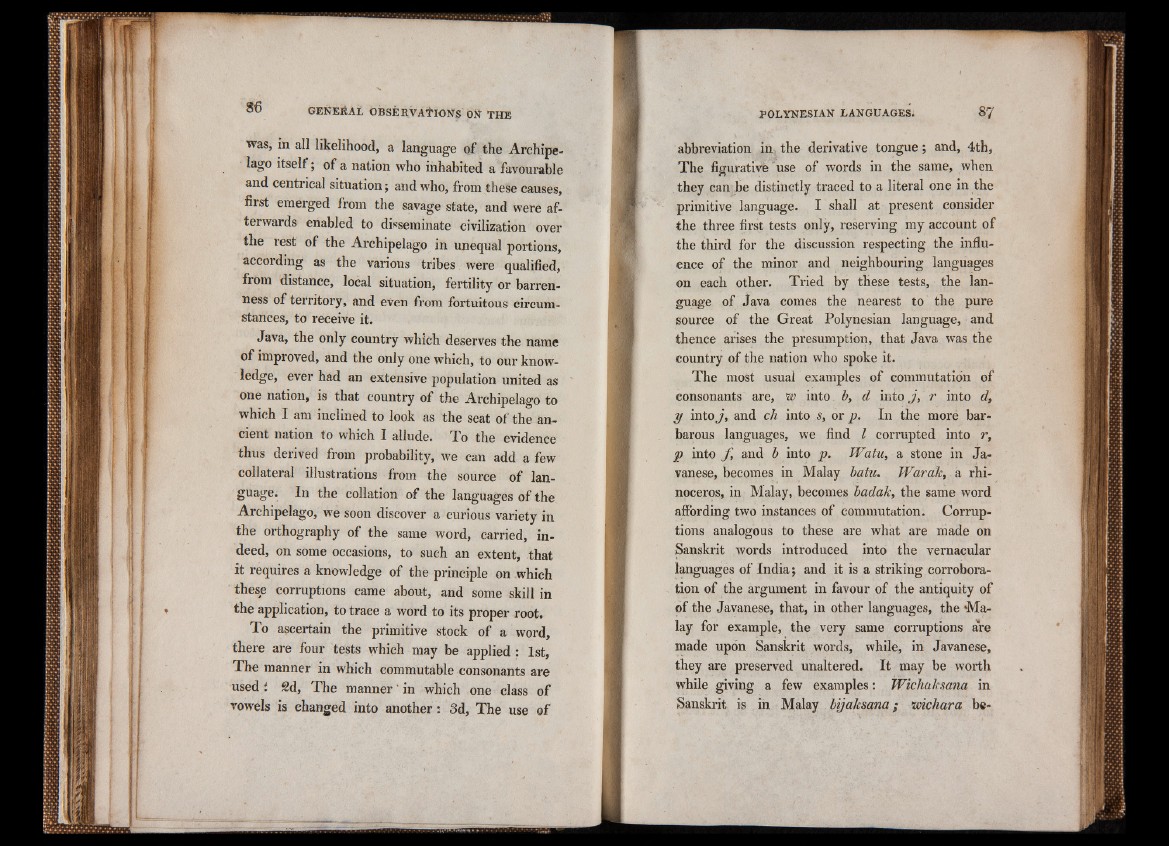
was, in all likelihood, a language of the Archipelago
itself; of a nation who inhabited a favourable
and centrical situation 5 and who, from these causes,
first emerged from the savage state, and were afterwards
enabled to disseminate civilization over
the rest of the Archipelago in unequal portions,
according as the various tribes were qualified,
from distance, local situation, fertility or barrenness
of territory, and even from fortuitous circumstances,
to receive it.
Java, the only country which deserves the name
ol" improved, and the only one which, to our knowledge,
ever had an extensive population united as
one nation, is that country of the Archipelago to
which I am inclined to look as the seat of the ancient
nation to which I allude. To the evidence
thus derived from probability, we can add a few
collateral illustrations from the source of language;
In the collation of the languages of the
Archipelago, we soon discover a curious variety in
the orthography of the same word, carried, indeed,
on some occasions, to such an extent, that
it requires a knowledge of the principle on which
these corruptions came about, and some skill in
the application, to trace a word to its proper root.
To ascertain the primitive stock of a word,
there are four tests which may be applied : 1 st,
The manner in which commutable consonants are
used i Sd, The manner' in which one class of
vowels is changed into another: 3d, The use of
abbreviation in, the derivative tongue ; and, 4th,
The figurative use of words in the same, when
they can be distinctly traced to a literal one in the
primitive language. I shall at present consider
the three first tests only, reserving my account of
the third for the discussion respecting the influence
of the minor and neighbouring languages
on each other. Tried by these tests, the language
of Java comes the nearest to the pure
source of the Great Polynesian language, and
thence arises the presumption, that Java was the
country of the nation who spoke it.
The most usual examples of commutation of
consonants are, w into b, d into j, r into d,
y intoj, and ch into s, or p. In the moré barbarous
languages, we find I corrupted into r,
p into f, and b into p. TVatu, a stone in Javanese,
becomes in Malay batu. WaraTc, a rhinoceros,
in Malay, becomes badak, the same word
affording two instances of commutation. Corruptions
analogous to these are what are made on
Sanskrit words introduced into the vernacular
languages of India ; and it is a striking corroboration
of the argument in favour of the antiquity of
of the Javanese, that, in other languages, the Malay
for example, the very same corruptions are
made upon Sanskrit words, while, in Javanese,
they are preserved unaltered. It may be worth
while giving a few examples : Wichaksana in
Sanskrit is in Malay bijaksana ; mchara be